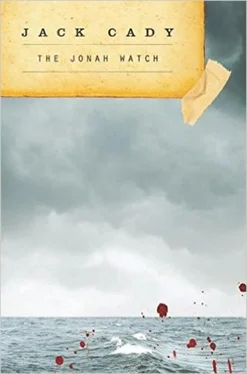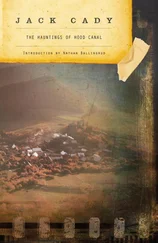I now understand that Tommy’s silence was the silence of madness. When he could not speak he took action, perhaps even trying to do the right thing; but I know now that no one could protect him from the knowledge that he had killed Case. I also know that Tommy protected me, for he had to have figured out my share of our mistakes. From that weather cutter to which our Cap transferred him, he slipped overboard in search of silence. He knew that, sooner or later in his drunkenness, the story would get abroad.
Tommy was heroic in his way. Darkness reached for him twice, the first time with depth charges, the second time with the grounding of the forty. He fought against darkness in the only way he could. He sought the eternal silence of death.
Darkness tries to kill light. I pulled the old claspknife from my pocket. Wert seemed only confused, while Case smiled. The interleaving forms of the lobsterman and Tommy appeared to express only sadness. Perhaps the knife should have been thrown overboard.
But, it still rests in my pocket, to be carried until death, and perhaps carried to the grave. This knife is all I have of youth, because I know now that the part of me that remains on that cold coast is the ghost of my youth, forever tied to the rising scream of diesels.
The men disappeared into mist as I groped the final approach to moorage. There is little left to say. I will return to Alaska, and will make three more trips from Anchorage, maybe four. Then I will retire and find a small apartment near the docks. Although I will never finish my business with my comrades and the sea, I think perhaps they have finished their business with me. We, who were never really at war, have somehow still discovered peace. I think that between all of us, all has been forgiven.
You ask when I’ve been most afraid at sea?
It’s hard to say, I don’t know if you mean
afraid of death or terrified or what.
I’ve seen some nasty scrapes, most sailors have,
but most of them will tell you they could work,
too busy to be very much afraid.
They aren’t lying either, scrapes at sea
come fast, you haven’t time to start on fear,
or if your trouble’s weather then you can’t
do more than pray and try to stay afloat.
The terror’s something else, no man who sails
is every free of feeling that a ghost,
(maybe his own) is lying at his back
about to show the thing that’s always there.
It doesn’t stand defining. Any name
you lay to it will not describe the feel
of madness that starts working in your head,
when you come close to looking in its eye.
You get it most in search, when someone’s lost
and you’re afraid you’ll find them, though for that
you stay out looking longer than there’s need.
A suicide will do it, or a fire;
a floater in the harbor, or a plane
that’s going in, the man still on the air
yelling his position as he falls.
A death is always lonely, but at sea
it’s almost like denial of the soul.
A bad one that I had was just last year.
Our coaster stood below the Portland Head.
The sea was calm, but right below its face;
a certain turbulence. Nothing to fear,
but one that sailors know and understand.
The water’s in a boil, it’s not a rip.
It moves in circling underwater waves
that scour the bottom. On the surface though
it’s hard to tell it’s there until the helm
tells you, but that’s not always sure,
not even when you’re full and riding low.
You learn to read the surface of the sea,
but more than that you have to feel it too.
We’d cleared the lightship forty minutes back.
There was no traffic, just one lobster boat
we didn’t think or care about until
we got in close, within a mile or less
and it cut a course across our bow,
just barely making way in such a style
of ‘I don’t give a damn about your size,’
that for a minute stopping her seemed wrong.
We cut the engines, threw her down to port
and cleared with maybe twenty yards to spare.
We’d started yelling ‘bastard’ as she cleared.
We choked up fast, the boat kept under way
without a man aboard, she’d turned her stern
and from our bridge we had a perfect view.
He’d been pulling out traps and like a fool
he’d brought no one along. A lot of them
do that, they think they won’t slip up
and can’t believe that they might ever drown.
To make it worse he’d pulled them under way.
It helps to do that if you’re working fast,
you don’t drift on your line, the slight seaway,
will help to clear your trap, it saves some pull,
but if it’s snagged you’re going to get a jerk.
His trap had snagged and pulled him overboard.
His boat still under way had left him there.
We ran her down to put a man aboard
and checked her fuel, the tanks were almost full.
He couldn’t have been in the water long.
We called it in, of course, a cutter came
and in the meantime we were on the search.
Our crewman took the boat and looked inshore.
We went to seaward, searching for the dead.
It’s then it gets you, knowing that they’re dead.
Knowing in that North Atlantic cold,
the body’s warm, the life is only gone.
You wonder what he thought when he went in.
A shock at first, a fight to clear his boots
that sucked him under down into the boil.
Did he break surface? Had he seen your ship?
And had he thought, ‘C’mon now, just hang on
and clear these goddamn boots and start to swim.
Just hang on for a little, just hang on,
they’re bound to get you when they see the boat.’
You stand your bridge and wonder, then you fear.
It works inside you, dragging your mind down
below the surface, down below your keel,
into the boil and tells you, makes you know,
that somewhere under you, a man like you,
does silent freezing handsprings in the sea.
Jack Cady (1932–2004) won the Atlantic Monthly “First” award in 1965 for his story, “The Burning.” He continued writing and authored nearly a dozen novels, one book of critical analysis of American literature, and more than fifty short stories. Over the course of his literary career, he won the Iowa Prize for Short Fiction, the National Literary Anthology Award, the Washington State Governor’s Award, the Nebula Award, the Bram Stoker Award, and the World Fantasy Award.
Prior to a lengthy career in education, Jack worked as a tree high climber, a Coast Guard seaman, an auctioneer, and a long-distance truck driver. He held teaching positions at the University of Washington, Clarion College, Knox College, the University of Alaska at Sitka, and Pacific Lutheran University. He spent many years living in Port Townsend, Washington.
Resurrection House, through its Underland Press imprint, is publishing a comprehensive retrospective of his work in a project called The Cady Collection.
Novels
The Hauntings of Hood Canal
Inagehi
The Jonah Watch
McDowell’s Ghost
The Man Who Could Make Things Vanish
The Off Season
Singleton
Street
Dark Dreaming [with Carol Orlock, as Pat Franklin]
Embrace of the Wolf [with Carol Orlock, as Pat Franklin]
Other Writings
Phantoms
Fathoms
Ephemera
Читать дальше












